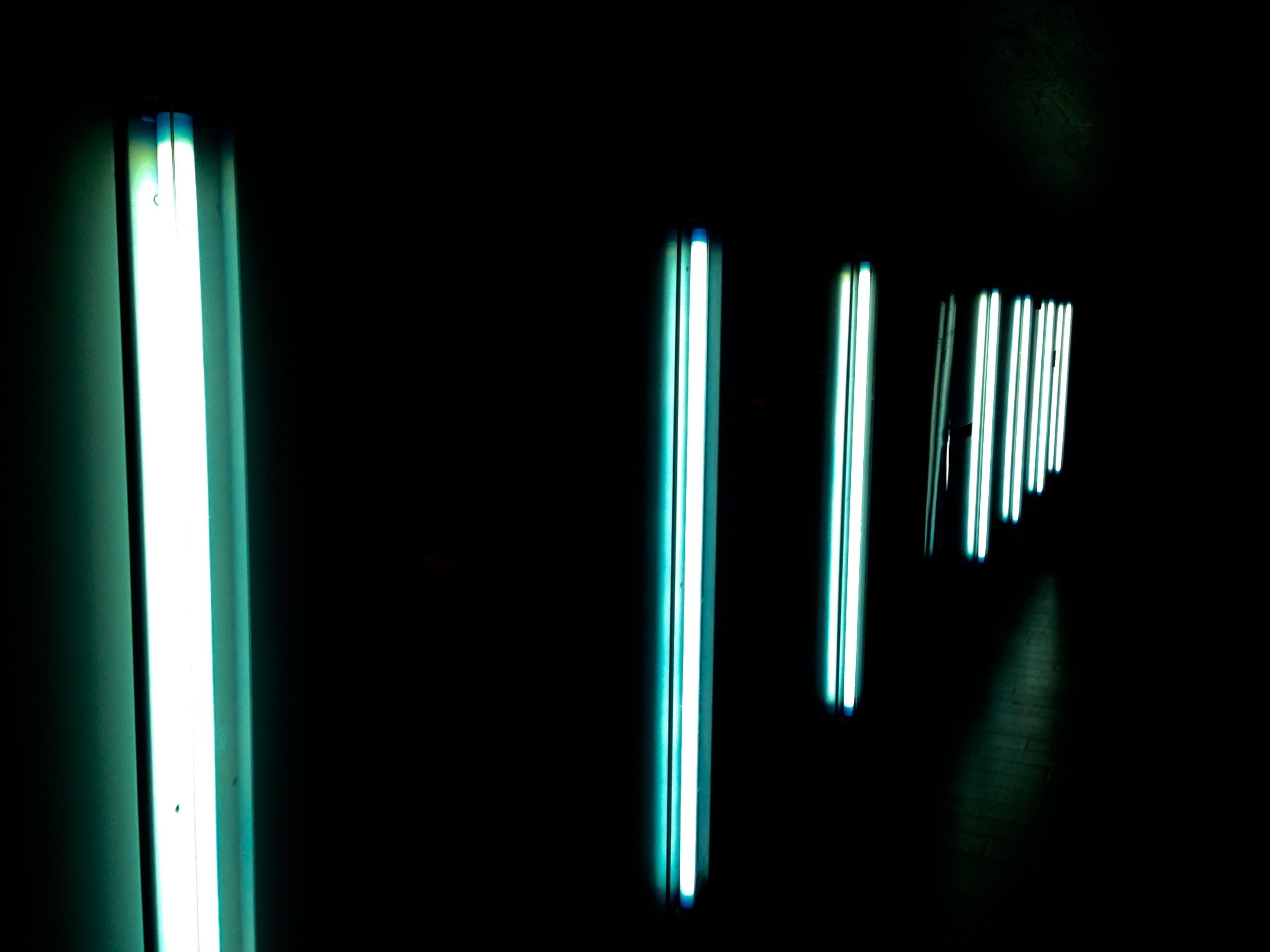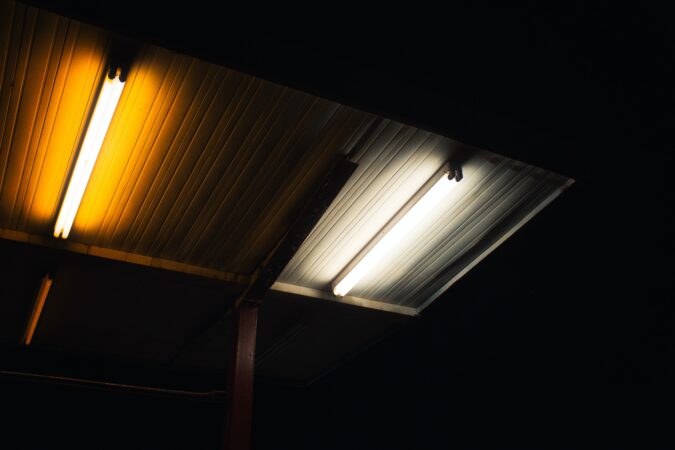
Fluorescent Tube Disposal
Fluorescent tubes are commonly used to light offices, schools, and other commercial spaces. However, when they burn out, they’re classed as hazardous waste as they contain mercury. Business owners must arrange correct disposal of fluorescent tubes to stay safe and compliant. Follow this guide to learn how to dispose of fluorescent tubes in the UK.
Whether you only have a few fluorescent bulbs to dispose of or are renovating an entire office, we work with businesses of all sizes anywhere in the UK. Get dedicated bins for your old light bulbs and just pay for collection. Contact us today or call 0800 211 8390 for a fast free quote.
Fast, Free Quotation
Get a fast FREE quote for your waste fluorescent tubes
- Free quote within 1 hr
- Any type of fluorescent tubes
- Bins and delivery
- We cover all of the UK
What are
fluorescent tubes?
Fluorescent tubes – sometimes called fluorescent bulbs or fluorescent lights – are glass tubes that convert fluorescence into visible light. While the body of a fluorescent tube is typically made from glass, they also contain some form of metal, such as aluminium. Phosphor on the inside surface fluoresces (shines or glows brightly) due to ultraviolet radiation from mercury vapour.
As the ‘fluorescence’ derives from mercury or mercury vapours, it can be incredibly toxic if not handled correctly. While their mercury content used to be much higher, the average fluorescent bulb now contains around 3.5mg of mercury.
This is why old fluorescent tubes class as hazardous waste. As a business owner, you must be aware of the proper fluorescent tube disposal practices when it’s time to switch their bulbs. Arranging fluorescent tube collection can ensure your old bulbs are disposed of safely.
Who needs
fluorescent tube disposal?
Fluorescent tubes are produced in large volumes across the UK. They’re used across many different industries, mainly within construction and manufacturing. You probably even have a few of these light bulbs lying around your home.
Businesses may need to arrange disposal if fluorescent bulbs break (during production or use) or simply burn out at the end of their life. For this reason, both companies that produce and use them most require removal of them. However, they’re produced and used most in large volumes by:
- Construction companies
- Manufacturing companies
- Factories
- Hospitality venues
- Laboratories
- Offices

How does fluorescent
tube collection work?
Process Block
How to dispose of
fluorescent tubes
You should never dispose of fluorescent tubes alongside the rest of your waste – such as in glass waste bins – even though they’re widely recyclable. If shattered, fluorescent bulbs can cause mercury gasses and vapours to escape into the surrounding atmosphere. When placed in general waste they can end up in landfill or be incinerated, releasing mercury vapours that contaminate the environment, water supplies, and wildlife.
As these gasses are odourless, it can be hard to identify when a leak occurs – which presents a severe health and safety issue for your employees, customers, and the general public. This issue is of such profound importance that it’s stated in the Waste Electric and Electronic Equipment (WEEE) Regulations 2013 that govern fluorescent tube disposal in the UK.
These disposal of fluorescent tubes regulations dictate that business owners must:
- Classify their waste
- Ensure that hazardous materials are stored in the appropriate bins and containers before collection
- Arrange for the waste to be collected by a licensed carrier
- Put together a waste transfer note
When storing your old fluorescent tubes before disposal, ensure they’re kept neatly and carefully in appropriate containers. Using the right containers makes recycling fluorescent tubes easier for everyone. Arrange fluorescent tube collection with Business Waste and we’ll provide appropriate bins for storage of your old bulbs.
Fluorescent bulbs
recycling facts
It’s estimated that around 100 million fluorescent tubes are in use across the UK today. The mercury contained in just one fluorescent tube could contaminate up to 30,000 litres of water if released through improper disposal.
WEEE waste is the UK’s fastest-growing waste stream – mainly because the amount of electric waste we produce increases by approximately 5% every year. However, fluorescent lamps are decreasing in popularity as more eco-friendly alternatives, such as LED bulbs, are now readily available. LED bulbs now make up two thirds of all bulbs sold in the UK.
As part of an eco-friendly directive, the sale of halogen light bulbs was banned in the UK from September 2021. Following this, UK government legislation also means the sale of fluorescent light bulbs will be banned from September 2023. After that happens the rate of fluorescent tube recycling could slow down until their usage is completely phased out.
Fluorescent tube
waste collection
Disposing of fluorescent tubes is quick and easy with Business Waste. Simply tell us how many old tubes you need removing and we’ll send you the right size and number of bins or lampbanks to meet your needs. Carefully place your waste tubes in the bins and we’ll collect at the agreed time, taking them to an appropriate recycling plant for proper disposal and reuse.
For more information about fluorescent tubes disposal or to get a free quote for our waste collection services, contact our expert team today. We can arrange collection of your old fluorescent tubes at a time that suits you and help you make significant changes to your waste disposal plan – saving you time and money.
Recycle your fluorescent tubes to protect your people and the environment, ensuring all legal and safety measures are met. We can provide quotes for lampbanks and collection. We collect fluorescent tubes from all over the UK, Call 0800 211 8390 to speak to one of our expert team or contact us online.
Read our reviews
As a temporary site manager of a large school I inherited a large collection of dead fluorescent tubes which had to be disposed of. As hazardous waste I approached my local recycling centre who had no interest? The Env Agency suggested I find a specialist company and I discovered Business Waste on-line offering a national service. I had a superb response from the outset. Sophie Waters explained the process and provided a very reasonable quote. Finn Stannard sorted the credit account and the Logisitcs team arranged timely collection and disposal. A very professional company who understood my problem and provided the perfect solution.Gary S
Premises Manager
Fluorescent tubes
bins and containers
At Business Waste, we can provide you with access to a range of bins and containers specifically designed to store fluorescent bulbs. Our fluorescent bulb bins are highly durable and weatherproof, making them the perfect storage solution for hazardous materials.
As old fluorescent tubes class as WEEE waste, it’s likely we’ll deliver you a WEEE waste bin to fill with your fluorescent tube recycling. Whether you have a handful of burnt-out bulbs or a full office floor’s worth, find the right size bins for your needs.
Fluorescent tube recycling
FAQs
-
Can I recycle light bulbs?
You can recycle most light bulbs and fluorescent tubes from your home at some household waste recycling centres. However, you can’t recycle incandescent or halogen light bulbs. Businesses can recycle light bulbs by arranging commercial waste collection of old bulbs, separate from your glass recycling collections.
Recycling light bulbs must be done separately from other glass recycling and you should never put them in your household recycling bin. This is because light bulbs often contain chemical elements that need removing before the glass can be recycled.
-
What’s the difference between a light bulb and a fluorescent tube?
While they serve the same purpose, the main difference between light bulbs and fluorescent tubes is that fluorescent tubes are more energy efficient. This is because they produce significantly less heat than a regular bulb.
They also produce light in different ways. For example, in a traditional light bulb, a metallic filament is slowly heated until it produces light. Whereas the light in a fluorescent bulb is derived from gasses.
-
How are fluorescent tubes recycled?
After your old fluorescent tubes are collected, they’re taken to a specialist recycling plant for processing. Here the tubes are deconstructed and the hazardous elements – such as mercury and phosphor powder – removed and isolated. This is then disposed of or reused in a safe manner.
The other elements of the fluorescent tube, such as the glass and metal, are then cleaned and checked to ensure they’re free from contaminates and separated into their separate waste streams. These then go through the same recycling process as other products within their relevant waste type – following glass waste and metal waste recycling, for example.
-
Can fluorescent tubes go to landfill?
No, fluorescent tubes should not go in landfill. This is because the mercury contained in them may release into the atmosphere and contaminate the environment – including water supplies and wildlife.
As a business you must abide by the Waste Electric and Electronic Equipment (WEEE) Regulations 2013, which requires safe and proper disposal of fluorescent tubes. They class as hazardous waste, so this means arranging disposal by a licensed carrier, who should recycle the tubes and ensure they do not end up in landfill.
-
What is the white powder in fluorescent tubes?
The white powder in new and used fluorescent tubes is phosphor. This substance emits light that’s visible when it absorbs ultraviolet energy rays. It determines the colour and temperature of the fluorescent light. However, this can emit mercury, which is hazardous.
-
How much mercury is in a fluorescent tube?
The amount of mercury in a fluorescent tube depends on its size. For example, many four-foot fluorescent tubes today contain around 12mg of mercury. This may sound a lot but is a lot less than similar sized tubes that had around 40mg of mercury in the 1980s. However, you can also find low-level mercury fluorescent tubs that only contain around 4mg, so check the manufacturer’s information to be sure.
Get a fast fluorescent tube disposal quote
Get a fast FREE quote for your fluorescent tube waste
- Free quote within 1 hr
- Any type of fluorescent tubes
- FREE bins and delivery
- We cover all of the UK
